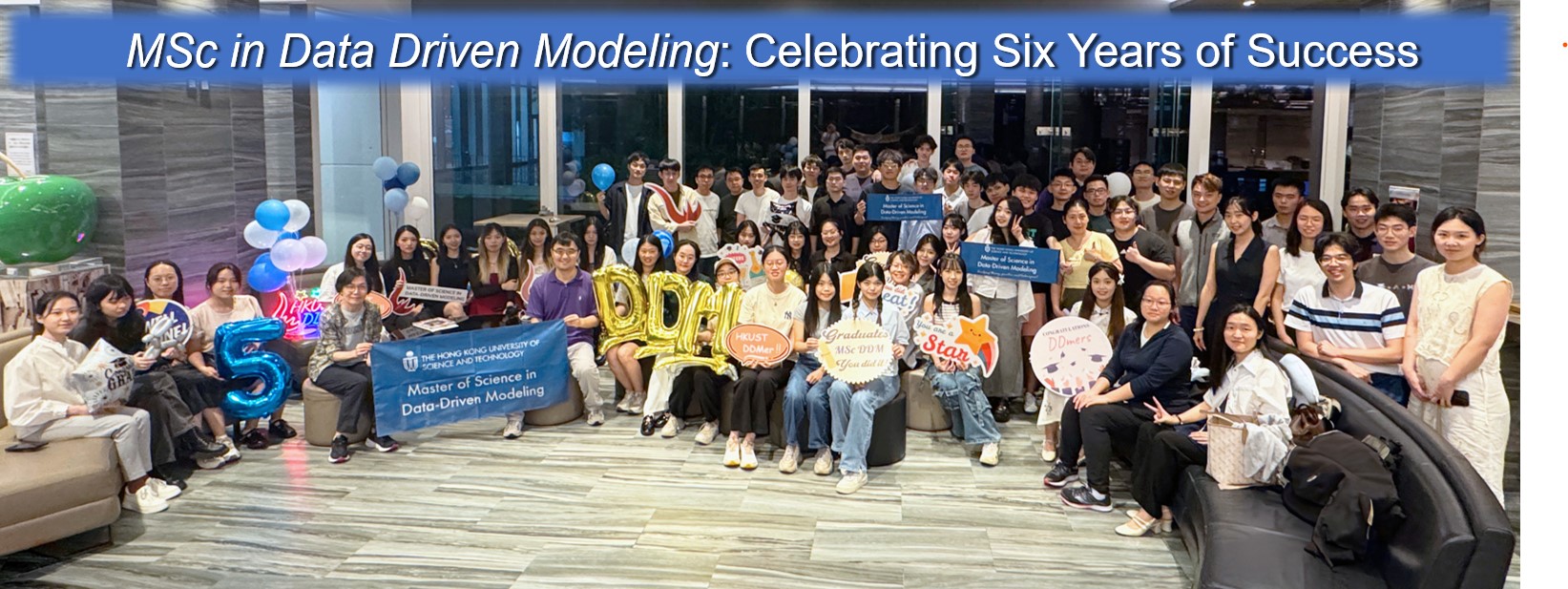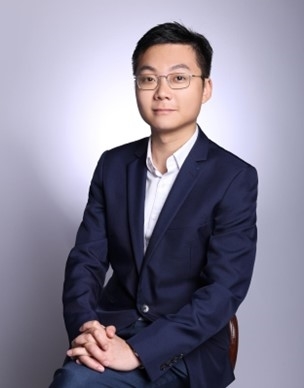
Preamble
The HKUST MSc Program in Data-Driven Modeling (MSc(DDM)) is celebrating the graduation of its 6th cohort in 2025. Jointly offered by the Departments of Physics and Mathematics, the MSc(DDM) program aims at training students with science or engineering background for careers that require advanced modeling skills bolstered by strong problem-solving capabilities. The curriculum and program structure seamlessly integrate industry instructors and feature seminar speakers from diverse sectors to ensure a comprehensive learning experience aligned with the program's objectives.
The initial employment profiles of the first five cohorts of MSc(DDM) program reveal diverse career paths spanning industries, roles, and regions. Engineering attracted over 24% of alumni, followed by Data science/Algorithm and AI-related (21.5%), banking/finance (20.4%), Education/Government (6.8%) and Entrepreneurship (2.0%), while 14.7% pursued further advanced studies. Key roles of our graduates included software engineers, data scientists, and machine learning engineers, emphasizing a strong focus on technology-driven professions. Graduates secured positions at esteemed organisations such as Tencent, Bank of China, Ant Group, and multinational corporations like P&G and L’Oréal. These outcomes underscore the program's alignment with high-demand sectors, global employer recognition, and competitive remuneration, particularly in tech and financial hubs. The inclusion of entrepreneurial ventures and academic pursuits further showcases the diverse career paths available to graduates.
The program received highly positive evaluations during its first 5-year Program Review carried out under the authority of the University. The panel, led by Prof. Reimer Kühn from King’s College London, commended the program for its exceptional academic quality and well-structured framework. It also praised the program’s delivery, assessment methods, and unwavering commitment to excellence.
We also invited three alumni to share their reflections on the program after gaining work experience. Below are their comments.
Huang Yu
Yu belonged to the first batch of MSc(DDM) graduates in 2020. After graduation she started as an Algorithm Engineer in Huawei, Shanghai, and is now Compiler and Programming Language Engineer in the same corporation.
Recalling her MSc days, she treasured most the rich resources provided by the Program, including courses of various fields which broadened her horizon, and facilities such as the library. At the same time, she treasured her friendships with classmates, many of whom she still maintains relationships.
The knowledge and skills she learned in the MSc Program helped her in two aspects. She explained, “Firstly, during my job search, my acquired skills such as data structure and algorithms prepared me to pass written tests, and my experience in projects enriched my CV and enabled me to demonstrate my eligibility during interviews. Secondly, after assuming my first job, my MSc training on soft skills such as teamwork and group project management became highly relevant.”
For junior students of the MSc Program, she emphasized, “It is important to set their goals early. Which job sector are they targeting? Will they consider industry or PhD? This will help them to select suitable projects and internships. If they are unprepared, they may lose direction once they become busy with coursework.”
 |
Hinz Shum
Hinz was also among the first cohort of MSc graduates in 2020. Following his graduation, he began his career as a Statistician responsible for international merchandise trade statistics and data science at the Census and Statistics Department of the Hong Kong Government before transitioning to his current role as a Data Scientist at the Hong Kong Monetary Authority. Hinz expressed great enthusiasm about implementing Generative AI in automating and enhancing various business functions, including but not limited to internal news surveillance frameworks and research processes.
Reflecting on his time in the MSc program, Hinz said, “I particularly valued the solid foundation it provided for my career development in data science, especially the hands-on experience in exploring diverse data sources and utilizing them effectively for informed decision-making. Moreover, the mock interview workshops offered by the program played a significant role in enhancing my job search success.” Beyond academics, Hinz greatly appreciated the networking opportunities with fellow alumni. Despite the pandemic forcing instruction online, their interactions on- and off-campus enabled him to remain updated on technological advancements and job market trends, ultimately facilitating his career advancement.
Among the skills acquired during the MSc program, data-driven programming stood out as the most impactful, yet he also emphasized significant growth in interpersonal abilities. Collaborating on group projects with classmates from diverse backgrounds enhanced his teamwork and leadership skills, which later enabled him to manage a team of 200 subordinates and lead different projects during his tenure with the government.
Hinz further expressed, “I encouraged incoming students to fully enjoy the program and actively engage in extracurricular activities and learning opportunities beyond the curriculum. With my current involvement in GenAI, I recommended students to deepen their knowledge in artificial intelligence, embrace its capabilities for problem-solving, and develop expertise in effectively prompting AI for optimal utilization.” Additionally, Hinz generously offered to conduct an expert workshop to share his experiences with current MSc students in February 2025, regarding practical applications and ethical use of GenAI.
Since Hinz’s graduation, the MSc Program has consistently strived to keep its curriculum aligned with cutting-edge developments
 |
Bumki Son
After a few years of work, Bumki entered the MSc Program in part-time mode among the fourth cohort of MSc graduates in 2023 . He is now Director of the Research Department in the Singapore branch of Barclays Bank. Quantitatively analyzing GDPs, global trade, monetary and fiscal policies has been his regular job. Thus, his MSc training in data modeling, analysis, and prediction are highly relevant to his career.
Looking back on his days in the MSc Program, Bumki said, “I treasured most the opportunities to meet different people with different backgrounds and perspectives, especially fellow part-time students as we had similar working experiences. Nonetheless, I also treasured the friendship with fresh bachelor graduates, who were young and energetic.” After graduation, he maintained contact with his friends, exchanging views and supporting each other. Indeed, the background diversity of students entering this MSc Program provided a unique environment for meaningful interactions.
He found that the knowledge and skills he acquired in the Program are certainly helpful. Bumki elaborated, “For example, I need the skills to distinguish between noise and trend in financial data. Moreover, I need to quantify the impact of Korean martial law on market sentiment. This led me to consider how “soft data” affects “hard data”, how complex models can be reduced to simple models.” Indeed, these are skills practiced in the MSc Program, where students learn to start with the basics, then build models, and solve problems systematically.
To junior students entering the Program, he advised, “Enjoy the time, make friends with different people, and cultivate intellectual curiosity of how the learned skills can be used in future careers. Those who are proactive in exploring new frontiers benefit most.”
He also hoped that the MSc program could have more part-time students joining. According to him, part-time students have strong motivation to learn after a few years of job experience. Their learning span is normally two years, which enables them to learn progressively from basics to applications.
 |
